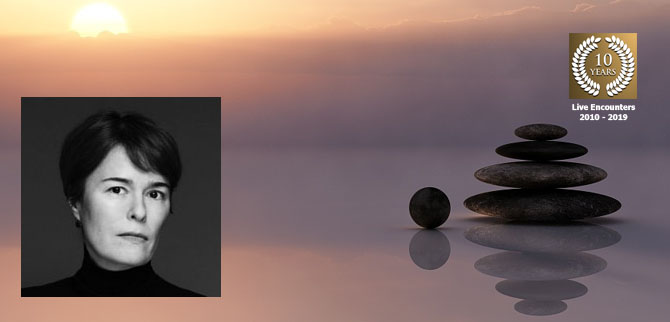Poem by Laura J Braverman
Laura Johanna Braverman is a writer and artist. Salt Water, a collection of poetry, was published in 2019 by Cosmographia Books. Her poetry has appeared in journals including Levure Litteraire, Live Encounters, and Sky Island Journal, and is forthcoming in the anthology Awake in the World, Volume II by Riverfeet Press. She lives in Lebanon and Austria with her family.
Mantra
1
Bound for Swami’s lodging, she slits her foot.
Crosswise, mid inner arch. Something hidden
off the path—serrated stone edge, stray glass;
can’t recall. And his name? Yes. That was it;
how it comes back, no idea. There he
is now on a laptop screen—twenty years
gone by with his wide doleful eyes. He looks
the same. Was he young before?
2
She slits her foot bound for Swami’s lodging.
Right, left? Was it glass? She turns back, makeshift
wash in the room, a plaster stuck, nearer
disintegration than she thought. Sick with
impending divorce and phantom illness.
3
She slits her foot. She sneaks, sneaks from her friend.
He’s a doctor—endocrinologist,
to be exact, half German, half Japanese.
He likes to snicker at camp rules. At quirks
of certain swamis in their orange robes.
She throws in her bit with him from time to
time and watches ashram life with measured
distance—but then the easy winds rise up—
4
from the turquoise expanse at ashram edge.
They unsettle broad paper-like leaves of
Caribbean trees. 4:30 morning
bells call acolytes from sleep. Breakers thump
in tidal time on packed white sand; birds twitch
in the half-light before song and flight.
5
At four weeks, there’s a choice to make—pick one
mantra from a sheet. With it comes a name.
The doctor and she agree: strange, this group
transmission. Indoctrination? Her friend
declines the offer. She’s unsure, then says No.
6
She should be somewhere else—keeping house, vows.
Instead, she’s hurt. The German swami says:
“You’ve run away, just like a child.” So much
for heeding that inner voice. Who has she
hurt the most? One of two is she—unhoused,
a traveler now, breaking camp a habit.
A one-woman Bedouin tribe stumbles
over a self-made desert. There once was
a tent. She lost it. A carpet—lost. Tea—spilled.
7
Though she’s said No to the mantra, there’s still
an all-night fest of chanting to attend.
Perched cross-legged atop a rolled up vinyl
mat, she sways—unsure of time in the metal
grey between dark and dawn’s first lit match.
8
What happens then? Subconscious life coming
through? Lack of sleep? The group chants one mantra
countless times. Some place or part in her wakes
to the ancient phoneme cluster—sounds of light,
they’ve been called. She chooses them, or is it
the reverse? She writes to the ashram chief,
Swami S—. Yes. She wants a mantra after all.
9
She slits her foot bound for Swami’s lodging.
Serrated stone edge, stray piece of glass. She’s
mostly barefoot here. Her uniform is
unwashed. It should be clean for this—
10
she arrives with plastered foot at his door.
Soon they face each other cross-legged
on the floor. The sad-eyed Swami chants. She
listens; looks. The walls go soft. Cryptic words
are charged, swoop and dart. She’s lost her tent,
her carpet, spilled her tea. But a teacher
offers up these quickened words and she
receives. He redeems her with a name.
© Laura J Braverman


